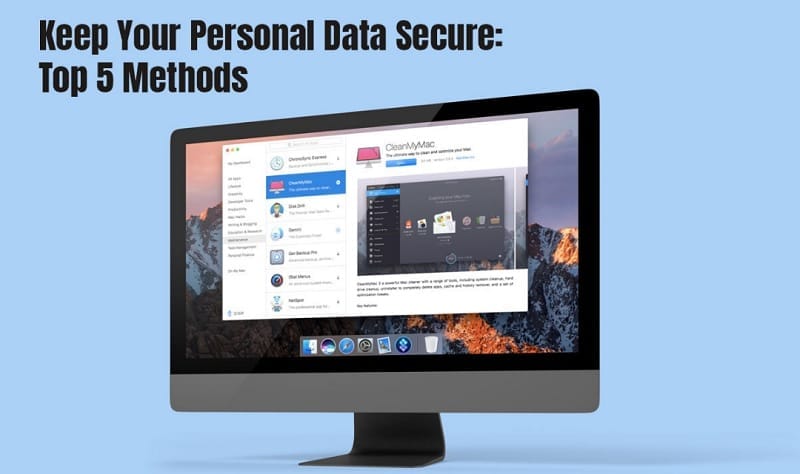In this digital age, when technology plays a major role in everyday activities, it is critical to prioritize the security of our personal data. With the increasing number of cyber threats and the potential risks associated with them, it becomes essential to adopt effective measures to safeguard our sensitive information. This article will outline the top 5 methods to keep your personal data secure, with a focus on recent searches, a common vulnerability that hackers exploit.
Recent Searches and Data Security
When discussing personal data security, recent searches play a significant role. Search engines and browsing history store valuable information about your interests, preferences, and online activities. Hackers may exploit this data to gain insights into your habits and even launch targeted attacks. It is important to address recent searches to bolster your data security.
What are the top 5 methods to keep my personal data secure?
Strong and Unique Passwords
One of the fundamental steps to protect your personal data is to create strong and unique passwords. Avoid using common words, predictable combinations, or personal information that can be easily guessed.
Instead, opt for a combination of upper and lower case letters, numbers, and special characters. Additionally, refrain from reusing passwords across different platforms, as this can compromise your accounts if one password is compromised.
Two-Factor Authentication (2FA)
Adding two-factor authentication to your accounts adds an extra degree of security. By enabling 2FA, you require a second verification step, usually a unique code sent to your mobile device, in addition to your password.
This method ensures that even if someone manages to obtain your password, they still need physical access to your mobile device to gain entry. Always enable 2FA whenever possible to enhance your account security.
Regularly Clear Browsing History and Cookies
Clearing your browsing history and cookies at regular intervals helps minimize the data available to potential threats. By erasing your recent searches, you reduce the chances of someone gaining access to sensitive information through unauthorized means.
Most web browsers provide options to clear browsing data, including history, cookies, and cached files, which should be utilized frequently.
Utilize Private Browsing Mode
When browsing the internet, consider using private browsing mode, also known as “incognito” mode, offered by most web browsers.
This mode prevents the browser from storing your search history, cookies, and temporary files, thus reducing the amount of personal data that can be accessed. While private browsing mode does not offer complete anonymity, it provides an additional layer of protection.
Opt for a Virtual Private Network (VPN)
A VPN encrypts your internet connection and routes your traffic through secure servers, making it difficult for hackers to intercept your data.
By using a VPN, your online activities become anonymous, preventing unauthorized entities from tracking your browsing habits. Additionally, a VPN allows you to connect to public Wi-Fi networks securely, safeguarding your data from potential eavesdropping.
What questions should I ask about data security?
How is my personal data collected and stored?
Understanding how your personal data is collected and stored is crucial in assessing its security. Ask service providers and organizations about their data collection methods, whether it’s through website forms, user accounts, or other means. Inquire about their data storage practices, such as encryption and access controls, to ensure your information is protected.
What security measures are in place to prevent unauthorized access?
Inquire about the security measures implemented by organizations to prevent unauthorized access to your data. Ask about authentication protocols, firewalls, and intrusion detection systems they have in place. Understanding these measures can help you evaluate the level of protection provided for your personal information.
How is my data shared with third parties?
It is important to know how your data is shared with third parties, if at all. Ask about the circumstances under which your information might be shared and the precautions taken to protect it during the transfer process.
Ensure that organizations have strict data-sharing agreements in place to safeguard your data when it is shared externally.
What are some recommended tools or software for safeguarding personal data?
Password Managers
Password managers are convenient tools that generate and securely store strong, unique passwords for all your accounts. They help you avoid the risk of using weak or repetitive passwords that can compromise your data. Popular password managers include LastPass, Dashlane, and KeePass.
Virtual Private Networks (VPNs)
VPNs generate an encrypted tunnel between your device and the internet, ensuring that your online activities remain private and secure. They protect your data from eavesdropping and provide anonymity. Trusted VPN providers include NordVPN, ExpressVPN, and CyberGhost.
Antivirus and Antimalware Software
Installing reputable antivirus and antimalware software on your devices is essential for detecting and removing malicious software that could compromise your personal data. Some well-known options are Avast, Norton, and Bitdefender.
In conclusion, safeguarding your personal data is paramount in today’s digital landscape. By implementing the top 5 methods mentioned earlier, which include using strong and unique passwords, enabling two-factor authentication, regularly clearing browsing history and cookies, utilizing private browsing mode, and opting for a virtual private network (VPN), you can greatly enhance the security of your data.
Addressing vulnerabilities such as recent searches is crucial to protect your personal information from potential threats proactively. By asking pertinent questions about data security, you can evaluate the protective measures implemented by organizations.
Additionally, employing privacy settings, considering privacy-focused search engines, and utilizing recommended tools like password managers, VPNs, and antivirus software can further bolster the security of your personal data. Remaining vigilant, staying informed, and taking proactive steps will contribute to a safer online experience.








